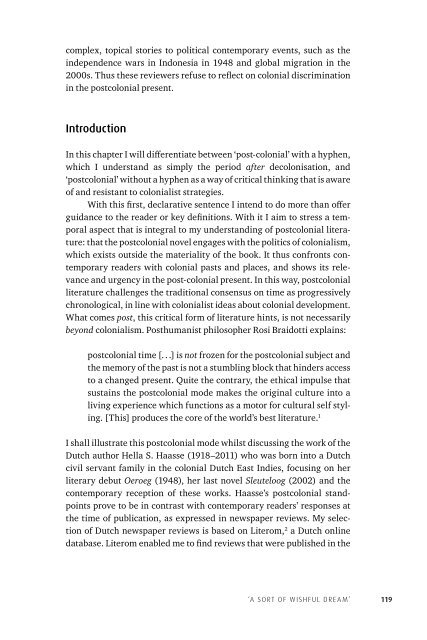Discord Consensus
7aze300jFJo
7aze300jFJo
Create successful ePaper yourself
Turn your PDF publications into a flip-book with our unique Google optimized e-Paper software.
complex, topical stories to political contemporary events, such as the<br />
independence wars in Indonesia in 1948 and global migration in the<br />
2000s. Thus these reviewers refuse to reflect on colonial discrimination<br />
in the postcolonial present.<br />
Introduction<br />
In this chapter I will differentiate between ‘post-colonial’ with a hyphen,<br />
which I understand as simply the period after decolonisation, and<br />
‘postcolonial’ without a hyphen as a way of critical thinking that is aware<br />
of and resistant to colonialist strategies.<br />
With this first, declarative sentence I intend to do more than offer<br />
guidance to the reader or key definitions. With it I aim to stress a temporal<br />
aspect that is integral to my understanding of postcolonial literature:<br />
that the postcolonial novel engages with the politics of colonialism,<br />
which exists outside the materiality of the book. It thus confronts contemporary<br />
readers with colonial pasts and places, and shows its relevance<br />
and urgency in the post-colonial present. In this way, postcolonial<br />
literature challenges the traditional consensus on time as progressively<br />
chronological, in line with colonialist ideas about colonial development.<br />
What comes post, this critical form of literature hints, is not necessarily<br />
beyond colonialism. Posthumanist philosopher Rosi Braidotti explains:<br />
postcolonial time [. . .] is not frozen for the postcolonial subject and<br />
the memory of the past is not a stumbling block that hinders access<br />
to a changed present. Quite the contrary, the ethical impulse that<br />
sustains the postcolonial mode makes the original culture into a<br />
living experience which functions as a motor for cultural self styling.<br />
[This] produces the core of the world’s best literature. 1<br />
I shall illustrate this postcolonial mode whilst discussing the work of the<br />
Dutch author Hella S. Haasse (1918–2011) who was born into a Dutch<br />
civil servant family in the colonial Dutch East Indies, focusing on her<br />
literary debut Oeroeg (1948), her last novel Sleuteloog (2002) and the<br />
contemporary reception of these works. Haasse’s postcolonial standpoints<br />
prove to be in contrast with contemporary readers’ responses at<br />
the time of publication, as expressed in newspaper reviews. My selection<br />
of Dutch newspaper reviews is based on Literom, 2 a Dutch online<br />
database. Literom enabled me to find reviews that were published in the<br />
‘A sort of wishful dream’ 119


